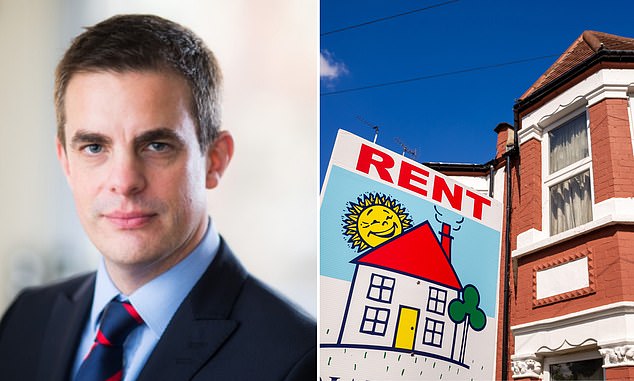I have a second home, a small two-bedroom flat, which I own on a £93,000 mortgage with a fixed interest rate of 2.69 per cent until October 2025.
The mortgage is due to be paid off in October 2035 and my primary residence is already paid off. My daughter currently lives in the second home rent-free.
Once she moves out later this year, I need to consider whether to change the mortgage to buy to let and rent out the property.
Early rental valuations indicate that the rent will cover the mortgage.
I have recently retired, although I am not due to collect my state pension for another seven years.
Should I use my private pension tax-free fund to pay the mortgage and use the rent as monthly income? What should I consider?
Buying a rental property: is it a good idea? Should this reader pay off the mortgage on the property he plans to rent? David Hollingworth answers
SCROLL DOWN TO FIND OUT HOW TO ASK DAVID HIS MORTGAGE QUESTION
David Hollingworth responds: Congratulations on your recent retirement, which I hope you are enjoying. Of course, retirement comes with certain considerations from an income standpoint.
It’s natural that you’re considering how best to use your existing assets and whether you should settle some of your outstanding liabilities to get the best overall result.
The good news for the existing mortgage on the second home is that it is currently at a low rate, compared to what you could get in today’s market.
The fact that you have provided a home for your daughter means that you may not have previously considered an alternative approach to ownership and the possibility of renting it out.
Do you need a new mortgage to buy a rental property? Check out the best rates you can access
Renting could generate an income that would not only cover the mortgage, but also provide additional income to bolster your retirement.
The current mortgage was presumably arranged on the basis that the property would be used as a second home, rather than as a rental property.
If so, to avoid breaching the terms of the mortgage when you start renting out the second home, you will need to seek consent from the current lender to rent out the property.
There is no guarantee that a lender will consent, and even if they do, there could be a cost.
The bottom line is whether you think the savings on mortgage interest will be enough to outweigh the return you could earn from your pension.
Lenders are more likely to give consent when the rental period will be for a particular reason, especially if it is for a temporary period.
Depending on the lender, they may charge a fee or increase the interest rate if you consent. However, that might be the preferred option since the current rate is low.
An alternative option that would allow the mortgage to continue would be to refinance it and change it to a buy-to-let mortgage, although that would involve an early repayment charge.
Lenders offering rental housing will want to be able to see that the rent will cover the mortgage interest by a certain margin.
Instead of using the mortgage rate, the interest calculation will often be done using a higher, stressed rate.
This will again vary by lender and may depend on your individual situation and product choice.
For example, the stress rate applied may be different depending on whether the homeowner is a basic or higher rate taxpayer, recognising that only basic rate tax relief applies to mortgage interest for tax purposes.
Similarly, a lower stress rate is likely to apply for a five-year fixed rate for a comparable remortgage.

Something to keep in mind: Rental properties may soon be required to meet energy efficiency standards, which could mean you may have to spend money to bring this property up to code.
A lender may require that rental income cover the mortgage interest by 145 percent, calculated at a rate of 2 percent above the mortgage rate for a short-term agreement.
Depending on the situation, lender and product, a £93,000 mortgage could require a rental income of between £500 and £800 per month.
Most landlords renting out a property will take out the mortgage on an interest-only basis as they plan to pay it off when they sell the property.
However, you may want to reduce the mortgage over time if you want to keep the property as a long-term source of income and not have to worry about a mortgage.
Buy-to-let products often have higher interest rates than standard mortgages. Fees can also be high, and many of the lower rates carry high fees, some of which are charged as a percentage of the mortgage.
Also think about other costs of operating a rental property, such as letting agents, as well as the possibility of vacancies if the property is left empty, for example between tenants.
Would that leave you with no income and still be able to pay the mortgage?
There is also a good chance that there will be stricter minimum energy performance requirements for rental properties in the future, something you should factor into your long-term thinking.
If energy efficiency improvements are required to achieve a minimum C rating on your Energy Performance Certificate, you may incur additional costs.
Deciding whether to use your pension lump sum to pay off your mortgage in full is not a black and white decision.
The question is whether you think the savings on mortgage interest will be enough to outweigh the return you could get from your pension.
It is not known how pension funds might continue to grow and whether they could potentially generate a better income than rental property in the future.
Keeping the mortgage in the meantime could help you better understand the metrics, and although the interest relief is not as generous as in the past, you can claim the base rate.
However, make sure you have sufficient funds in the fund, as you will need to meet the mortgage payment even if there is a period without tenants.
If you can get your lender’s consent, it will give you a period at a good rate and avoid any prepayment charges.
You’ll also get a good idea of the costs and practicalities of owning a pension, without having to rush into a decision about your pension.
Some links in this article may be affiliate links. If you click on them we may earn a small commission. This helps us fund This Is Money and keep it free to use. We do not write articles to promote products. We do not allow any commercial relationships to affect our editorial independence.


